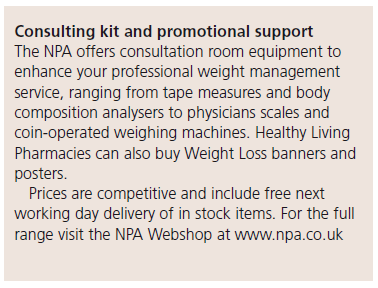The market for weight loss products is moving in the direction of a personalised, supportive and structured service offer, says Christine Michael
At New Year millions of people are likely to resolve to lose weight and get fitter, but all too often their good intentions prove short-lived, and obesity remains an intractable public health problem. Data compiled by the World Cancer Research Fund show that in 2010 in England, 62.8 per cent of adults were overweight or obese, and the direct cost of obesity related illness to the NHS was estimated at £5.1bn a year. In Scotland, 65 per cent of adults were overweight or obese, while the figures for Northern Ireland and Wales are 59 per cent and 57 per cent respectively.
For pharmacies, January and February are key times of the year to engage with customers who want to slim, whether on an opportunistic basis, as part of a broader healthy lifestyle offering, or as a commissioned enhanced service.
Keeping track
NPA Board Member and Alliance Healthcare Awards Welsh Pharmacy of the Year shortlisted nominee,

Chris Jenkins, of St Clears Pharmacy in Carmarthenshire, introduced a weight loss service earlier this year, and says it has created a “virtuous cycle” for the pharmacy as a whole. “We enjoy a positive reputation for our successful weight management service, strengthening our position and creating a benchmark in customer care within the local community,” he says. “More than 50 people have enrolled, and some travel up to 30 miles for the service; it even has a local Facebook page.”
One advantage of offering a service based weight loss programme rather than a more ad hoc approach is the opportunity it provides to compile data for potential commissioners. This lies behind the introduction of a ‘Patient Tracker’ audit tool, a new feature of the Lipotrim VLCD programme, which has been running for 25 years and is now available in nearly 2,000 pharmacies. “It is important to have the tools that can satisfy the need for documentation of achievement in this era of evidence-based treatments,” says Gareth Evans, a community pharmacist who offers the Lipotrim programme in East Anglia. His analysis shows that the mean weight loss of 382 people who completed three or more weeks on total food replacement was around 10kg, from 91kg to 81kg on average. “The Patient Tracker software allows me to present evidence not only of individual patients’ experience but also the achievements of cohorts of patients, which has become important for commissioning – for example, to show that successful weight loss is found even in patients with extremely high BMI,” says Mr Evans.
Diet demand
Market analysts Euromonitor International sees growth in `one stop shop’ weight loss services like the Lipotrim programme, as consumers “shift away from weight loss tablets and pills, and towards meal replacement programmes and holistic diet alternatives… due in part to the prevailing economic conditions”.
Its analysis shows some volatility in the retail weight loss category, explained mainly by the dramatic impact of Alli, from GlaxoSmithKline Healthcare (GSK), from its launch as an OTC product in 2009, to a subsequent fall off in sales in 2011.
However, having resolved difficulties with supplies of the product, GSK relaunched Alli in time for the 2012 Christmas and New Year market. Their major campaign of press and online advertising and in-store support, was primarily aimed at females aged 35 and over, with a BMI of 28 or more.
Nevertheless, Euromonitor still forecasts virtually flat sales in the category between 2012 and 2016, with compound annual growth of only 0.4 per cent, rising to an annual total of £128.6m by 2016.
One catalyst for change in the slimming supplement market is the latest batch of claims guidelines from the European 27Food Safety Agency (EFSA), which came into force in December 2012, and which may now lead to some products that make unapproved claims being withdrawn or relaunched with amended packaging.
Products with approved claims are likely to benefit, says Sanjay Mistry of Inovate Health. His company markets Slimsticks, a product containing konjac mannan, a vegetable fibre that the EFSA approves for “weight loss in the context of a hypocaloric diet”. Launching with a short term listing in selected Boots stores, Slimsticks will be rolled out to independent pharmacies through 2013. Other products that have EFSA approved claims are also now likely to want to push their advantage.
Compared with offering slimming products, introducing a personalised service may seem onerous in terms of time and training, but Chris Jenkins believes it is still worthwhile.
“Two members of staff have taken full responsibility for the weight loss service and have great pride in doing this,” he says. “They have the chance to develop new skills, and although it takes time to run such a service it is well invested time – time to care for patients and to make a real difference in their lives.”
PDF Version: Weight-loss-Jan13

